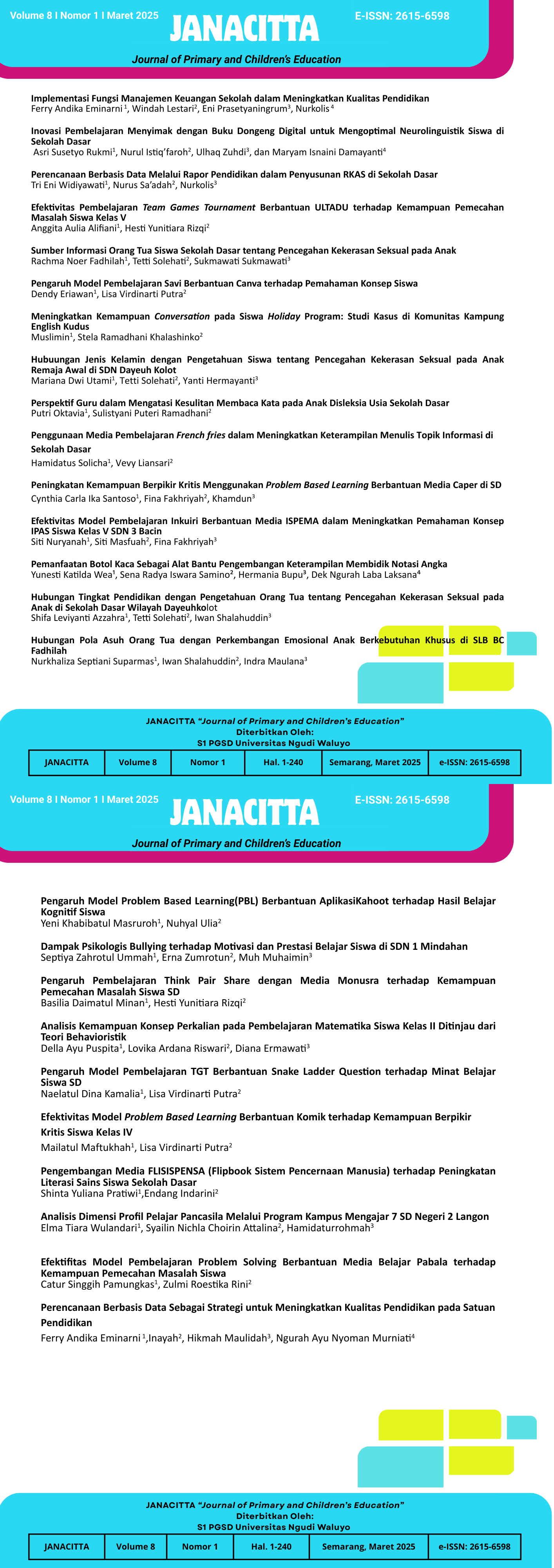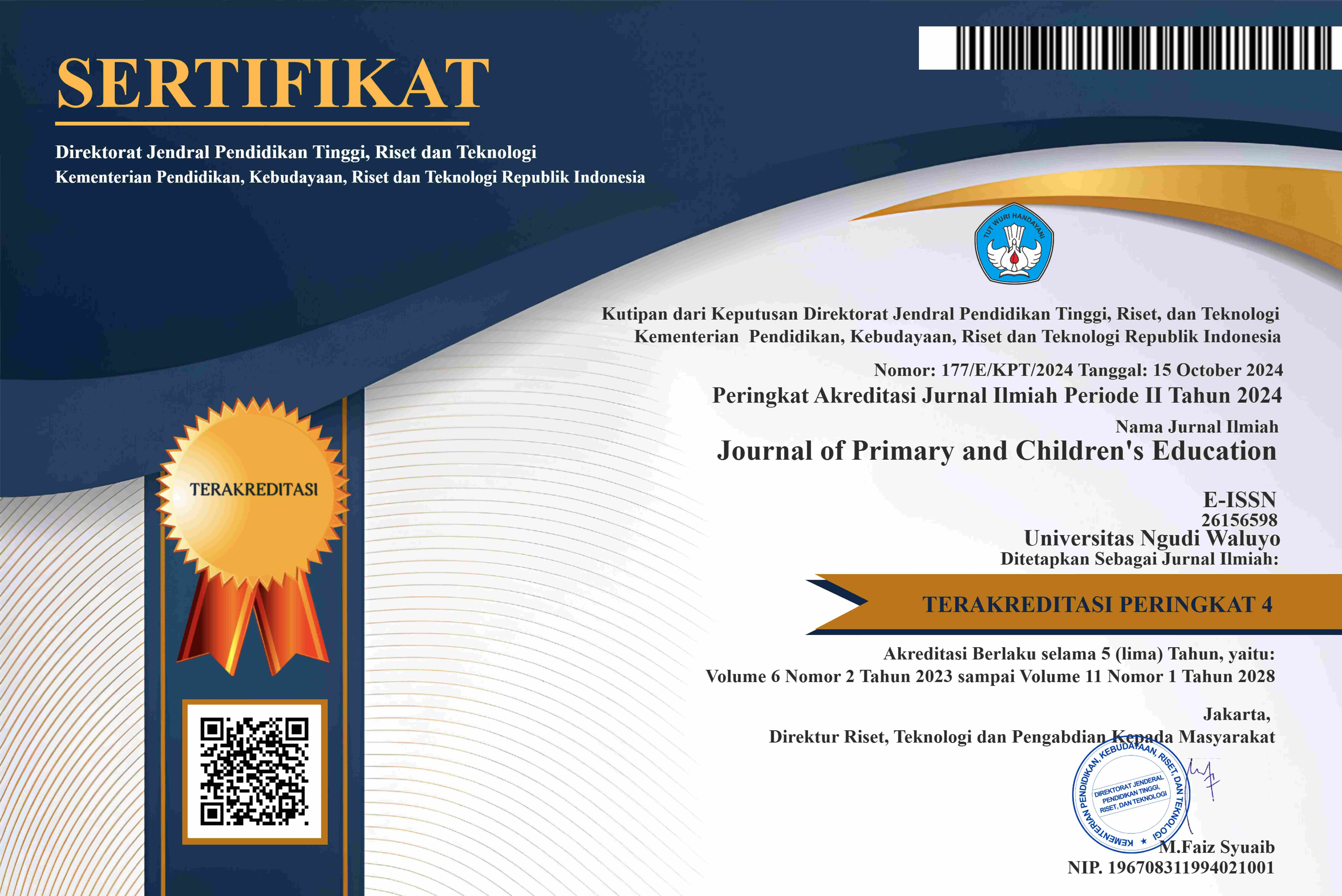Efektivitas Model Problem Based Learning Berbantuan Komik terhadap Kemampuan Berpikir Kritis Siswa Kelas IV
DOI:
https://doi.org/10.35473/janacitta.v8i1.3820Abstract
Abstract
This research aims to test the effectiveness of the comic-assisted Problem Based Learning model on the critical thinking skills of grade IV students of SD Negeri Bandungan 01. The research carried out was quantitative using a quasi-experimental method, in the form of a one-group pretest–posttest design. Data collection techniques to measure the learning outcomes of students' critical thinking skills with assessments in the form of pretest and posttest. The research sample was 28 students in grade IV A SD Negeri Bandungan 01. The results of the study showed that there was an increase in student learning outcomes as evidenced by the comparison of pretest and posttest results, the posttest score was much higher with an average of 64.57 compared to the pretest score with an average of 39.57. So it can be concluded that the comic-assisted Problem Based Learning model is effective on the critical thinking skills of grade IV students of SD Negeri Bandungan 01. Based on the results of this study, suggestions can be given so that teachers can implement the comic-assisted Problem Based Learning model to create effective and fun learning for students.
Abstrak
Penelitian ini bertujuan untuk menguji keefektifan model Problem Based Learning berbantuan komik terhadap kemampuan berpikir kritis siswa kelas IV SD Negeri Bandungan 01. Penelitian yang dilaksanakan berjenis kuantitatif menggunakan metode quasi eksperimen, dengan bentuk desain one-group pretest–posttest design. Teknik pengumpulan data untuk mengukur hasil belajar kemampuan berpikir kritis siswa dengan penilaian berupa pretest dan posttest. Sampel penelitian adalah siswa kelas IV A SD Negeri Bandungan 01 sebanyak 28 siswa. Hasil penelitian menunjukkan bahwa terdapat peningkatan hasil belajar siswa dibuktikan dengan perbandingan hasil pretest dan posttest, nilai posttest jauh lebih tinggi dengan rata-rata 64,57 dibandingkan nilai pretest dengan rata-rata 39,57. Sehingga dapat diambil kesimpulan bahwa model Problem Based Learning berbantuan komik efektif terhadap kemampuan berpikir kritis siswa kelas IV SD Negeri Bandungan 01. Berdasarkan hasil penelitian ini, dapat diberikan saran agar guru bisa mengimplementasikan model Problem Based Learning berbantuan komik agar tercipta pembelajaran efektif serta menyenangkan untuk siswa.
References
Aisah, S., Panglipur, I. R., & Sujiwo, D. A. C. (2023). Analisis Pembelajaran Problem Based Learning (PBL) dengan Pemecahan Masalah Berbantuan Komik Literasi Numerasi dan Etnomatematika. Prismatika: Jurnal Pendidikan dan Riset Matematika, 6(1), 211–220. http://ejurnal.uibu.ac.id/index.php/prismatika
Ayu, R., Dewi, M., Nuzul Agnafia, D., & Setyowati, R. (2024). Pengaruh Model Pembelajaran Problem Based Learning berbantuan Media Komik Digital terhadap Kemampuan Berpikir Kritis Siswa pada Materi Fotosintesis Kelas IV SD Negeri. EDUKASIA: Jurnal Pendidikan dan Pembelajaran, 5, 841–850. https://jurnaledukasia.org
Ayu Ratnasari, P. (2021). Konsep Kemampuan Berpikir Kritis. EDUKASIA: Jurnal Pendidikan dan Pembelajaran, https://jurnaledukasia.org
Dahlia Sari, E., Sylviana Zanthy, L., Purwasih, R. (2022). Meningkatkan Kemampuan Berpikir Kritis Matematis Siswa Kelas XI SMK dengan Model Problem Based Learning dan Media Komika Pro Berbantuan Geogebra. Jurnal Pembelajaran Matematika Inovatif, 5(6). https://journal.ikipsiliwangi.ac.id/index.php/jpmi
Kurnia Putri, D., & Purwanti, K. Y. (2023). Pengaruh Model Pembelajaran Problem-Based Learning (PBL) Berbantuan Media Pop-Up Book terhadap Kemampuan Berpikir Kritis Siswa. Trihayu: Jurnal Pendidikan Ke-SD-An, 10(1), 56–65. https://jurnal.ustjogja.ac.id/index.php/trihayu
Melathi, D. R., & Putra, L. V. (2022). Pengaruh Model Problem Based Learning Berbantuan Permainan Monopoli terhadap Kemampuan Pemecahan Masalah Siswa. JANACITTA: Journal of Primary and Children's Education. http://jurnal.unw.ac.id/index.php/janacitta
Mulyani, R. E., Masfingatin, T., & Suparwati, A. (2024). Problem Based Learning Terintegrasi Pendekatan Teaching at the Right Level untuk Meningkatkan Kemampuan Berpikir Kritis Siswa. EDUKASIA: Jurnal Pendidikan dan Pembelajaran, 5, 1589–1604. https://jurnaledukasia.org
Nisa, K., Nursyahidah, F., Saputra, H. J., & Junaidi, A. (2023). Model Problem Based Learning pada Muatan Pelajaran Bahasa Indonesia di Sekolah Dasar. Jurnal Educatio FKIP UNMA, 9(2), 948–955. https://ejournal.unma.ac.id/index.php/educatio
Purwanti, K. Y., & Rini, Z. R. (2022). Keefektifan Pbl Berbasis Games Berbantuan Brain Math Puzzle terhadap Kemampuan Berpikir Kritis Siswa SD. Elementary School Journal PGSD FIP Unimed, 12(4), 300. https://jurnal.unimed.ac.id
Putra, L. V. (2024). Pengaruh Pembelajaran Berbasis Proyek terhadap Kemampuan Kerja Sama dan Kemampuan Berpikir Kreatif Mahasiswa. JANACITTA: Journal of Primary and Children's Education. http://jurnal.unw.ac.id/index.php/janacitta
Safitri Siregar, R. (2019). Berfikir Kritis Menurut Para Ahli dan Penerapannya dalam Lingkup Keperawatan. EDUKASIA: Jurnal Pendidikan dan Pembelajaran. https://jurnaledukasia.org
Vismala Bahari, F. (2021). Pengembangan Permainan Ular Tangga pada Materi Pertumbuhan dan Perkembangan untuk Melatihkan Keterampilan Berpikir Kritis Siswa Kelas XII SMA (Vol. 10, Issue 3). https://ejournal.unesa.ac.id/index.php/bioedu
Waritsa Firdausi, B., & Yermiandhoko, Y. (2021). Peningkatan Kemampuan Berpikir Kritis pada Siswa Sekolah Dasar. Jurnal MUDARRISUNA: Media Kajian Pendidikan Agama Islam, 11(2). https://jurnal.ar-raniry.ac.id/index.php/mudarrisuna
Downloads
Published
How to Cite
Issue
Section
License
Copyright notice:
- Authors retain copyright and grant the journal right of first publication with the work simultaneously licensed under Creative Commons Attribution License that allows others to share the work with an acknowledgement of the work's authorship and initial publication in this journal.
- Authors are able to enter into separate, additional contractual arrangements for the non-exclusive distribution of the journal's published version of the work (e.g., post it to an institutional repository or publish it in a book), with an acknowledgement of its initial publication in this journal.
- Authors are permitted and encouraged to post their work online (e.g., in institutional repositories or on their website) prior to and during the submission process, as it can lead to productive exchanges, as well as earlier and greater citation of published work (The Effect of Open Access)







